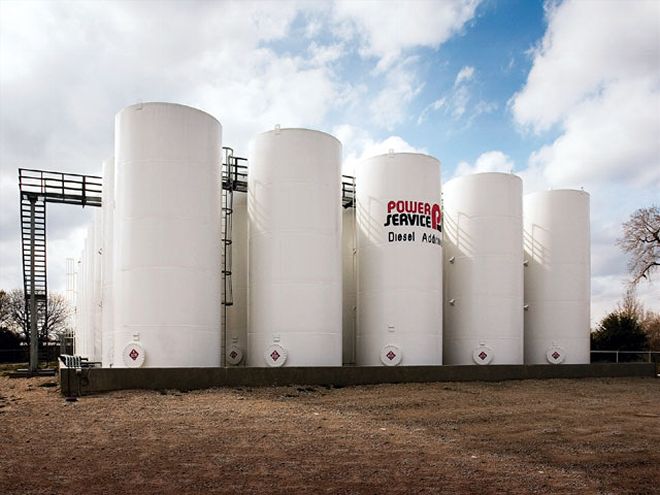
| Here are the 750,000-gallon bulk chemical storage towers on Power Service's 26-acre manufacturing facility.
Diesel fuel is a commodity we spend a lot of money on, know little about, and hardly ever see. Yet it is the lifeblood of our passion. If we are what we eat, then a diesel engine is the fuel it consumes. Just as we can fill our bodies with junk food, the same holds true for the fuel tanks in our vehicles. For a healthy, running compression- ignition engine, you need to know a little about the fuel you're buying.
Understanding FuelThe diesel fuel you purchase at the pump is a commercial-grade product that's often traded on the commodity market, much in the same manner that base gasoline, precious metals, and grains are. The federal government imposes minimum acceptable standards for all motor fuels used on public highways, but these requirements are only bare minimums. Diesel has not yet gained the popularity of gasoline as a motor fuel, so the oil companies and retailers traditionally haven't looked at it as a competitive market, but rather as a consumable that will sell itself. Unlike gasoline brands that are advertised to include additives that will clean fuel injectors and carbon deposits, nothing is ever mentioned about diesel fuel.
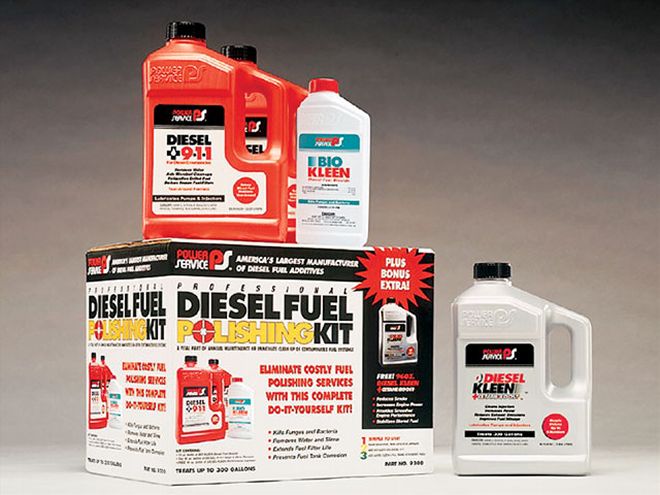
| diesel Fuel Kits front View
A Lesson In GasolineTo begin to understand diesel fuel quality, gasoline needs to be referenced. Gasoline is wholesaled as a base product that's not always refined by the company whose name is on the pump you're buying it from. The base fuel must meet a federal requirement called the lowest acceptable concentration (LAC) standard for fuel-injector cleanliness and minimizing deposit formation. Some expensive gasoline brands advertise their fuels as having more additives that will function above the LAC level. Thus, discount fuel has the federally mandated LAC level while others may have enhanced chemical properties. Gasoline is made into brand-specific products (Chevron, Exxon, Shell, and so on) at the distribution depot as the additives are mixed into the tanker truck as it's filled with base product.
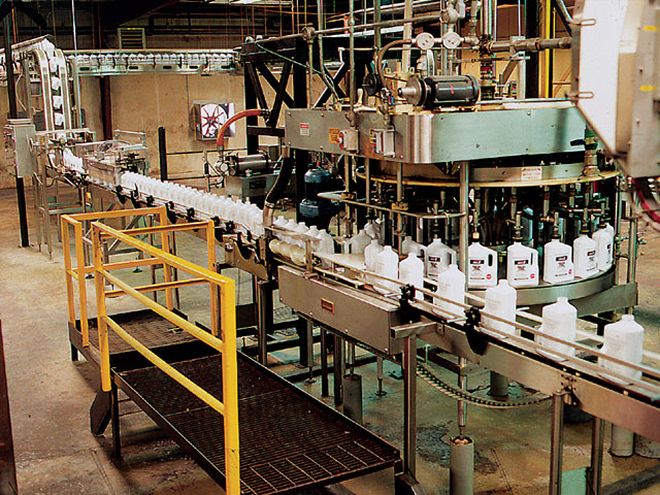
| diesel Fuel Factory inside
Diesel Fuel BasicsDiesel fuel that's purchased at the pump can be considered very similar to unbranded gasoline when examined for additives that will improve its performance. In other words, there really is no upscale or designer diesel fuel that you can buy. That means the task to make the fuel into what you want it to be for your engine is completely up to you.
Diesel fuel is a complex mixture of hydrocarbon molecules derived from crude oil by distillation. It's normally blended from several refinery streams with procedures that are often used to increase the production rate. As much as 20 percent of diesel fuel can consist of relatively heavy paraffinic hydrocarbons, which have limited solubility in the fuel. When cooled sufficiently, these particles tend to come out of the solution as wax. This is often referred to as fuel gelling that takes place in cold weather.
In addition, water can't be completely eliminated from diesel fuel. It can get into the fuel at various stages as it progresses through the distribution network from an oil refinery to your vehicle's fuel tank. Microbes may also grow in diesel fuel if it stays stagnant for a long period of time and is not treated.
When discussing diesel fuel, many technical terms are often used, but as a consumer, you don't need to understand all of them. The important ones are cetane, combustion improvers, detergent, lubricity, injector cleanliness, and cold-filter plugging point.
CetaneDiesel fuel's cetane number, which will usually be between 40 and 45, indicates the readiness of a diesel fuel to ignite spontaneously under temperature and pressure conditions in the engine's combustion chambers. The higher the cetane number, the shorter the delay between the fuel's injection and ignition.
Cetane improvers (ignition improvers) are used to increase the cetane number of diesel fuel by reducing the delay between injection and ignition when the fuel is sprayed into the combustion chambers. Diesel's cetane number is the most widely accepted measure of ignition quality and is determined by using a special cetane test engine. The cetane number of a fuel is determined by comparing its ignition delay, under standard operating conditions, with those of blends of two reference fuels (cetane and heptamethylnonane) having cetane numbers of 100 and 15.
Several types of chemicals-alkyl nitrates, ether nitrates, nitroso compounds, and certain peroxides-have been identified as effective cetane improvers. Studies by the petroleum industry have proved that engines care little if the improved cetane rating came from the refined fuel or an end-user-supplied additive.
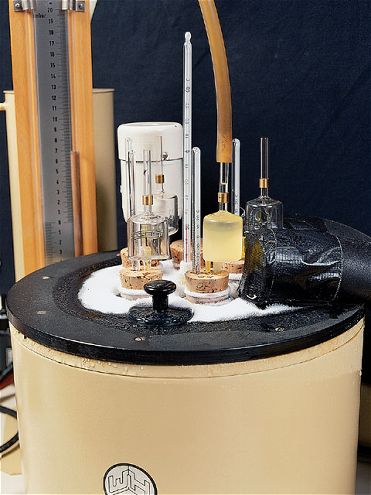
| The cold-filter plugging test confirms the effect of additives on the fuel's ability to stay liquid.
Why Cetane Is ImportantYour diesel engine's combustion sound is affected by the fuel's cetane rating. Low ignition-quality fuel is directly responsible for higher combustion noise levels. The rapid burning of the larger amount of fuel injected before ignition results in higher cylinder peak pressure, producing the characteristic diesel engine knock. The noise tends to be most evident during cold starting or cool running, as when accelerating after a period of idling or light-load operation. Cetane is not the only criterion of fuel-related combustion noise, however, as other characteristics such as volatility and composition can have a direct influence on the combustion event and the noise generated.
Most engines experience an increase in ignition delay of about 2 degrees crank angle when the cetane number is reduced from 53 to 41. In one test, direct-injection diesel engines were found to have a larger difference in the levels of ignition delay. Older indirect-injection diesels had similar, if relatively short, ignition delay periods when the fuel's cetane level was reduced.
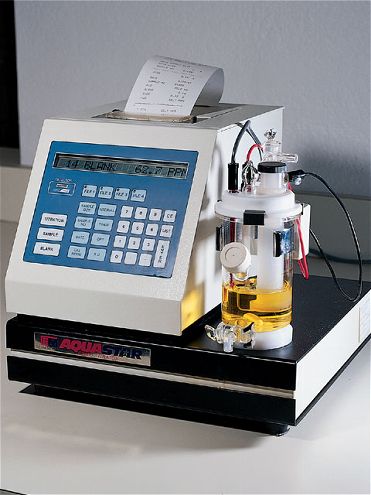
| A water titration test determines the water content in a sample of diesel fuel.
Cold-Filter Plugging Point (CFPP)This fuel criterion was eventually adopted in the USA from Europe as a further examination of the fuel's ability to make the engine stop running. It's the last in a series of tests for temperature that identify the cloud point (first visible wax), the wax appearance point, and the pour point (first sign of gelling).
The CFPP was developed from vehicles operated during a winter field trial. Fuels of different origins and base qualities were tested to observe how treatment with a pour depressant affected the test vehicles's low-temperature performance. The original field trials proved that operation down to a lower temperature was possible when a fuel was treated with an additive. Cold-engine start failures were caused by fuel starvation that was a result of wax accumulation on the fuel filters.
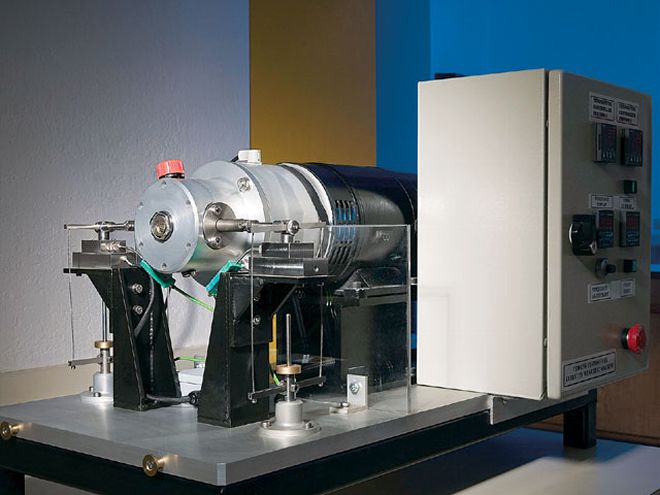
| This is a fuel lubricity wear test being performed in the laboratory.
LubricityLubricity is the ability of a liquid to reduce friction. Diesel fuel lubricity is extremely important to the life of components such as the injection pump and injector nozzles. Fuel with poor lubricating properties will cause expensive and premature failure of the mentioned components and can be thought of as running an engine with little or no oil in the crankcase. Ultra low sulfur diesel has required fuel suppliers to begin adding lubricity-enhancing chemicals to diesel before it gets to the pump.
DetergentsThe need for detergents in diesel fuel is of growing importance in controlling the formation of fuel deposits where they can have a detrimental effect on combustion. Gummy deposits in the fuel-injection system can cause injector needles to stick, resulting in misfires, power loss, and increased smoke and combustion noise. Lacquer and carbon deposits on injector tips can affect the spray pattern and the amount of fuel injected, causing reduced power and increased smoke. Starting may also become more difficult because of nozzle coking and deposit formations.
Diesel Fuel AdditivesUntil the '70s, there was little or no use of additives in diesel fuel. The product manufactured at most refineries was generally a blend of straight-run atmospheric distillate components, and apart from the sulfur content, the desired specifications could be met without the need for user-supplied additives. Cold-weather performance was a concern, but the early diesel engine operators blended diesel with kerosene to eliminate gelling. Today's modern, electrically controlled diesel engines can't use the same methods. In the U.S., where the enormous market has necessitated a high level of downstream conversion to yield more gasoline, diesel fuel quality has suffered. More low-cetane diesel fuel is being diverted for vehicle consumption because it can no longer be absorbed by the shrinking market for domestic heating oil. For this reason, the diesel owner may need to use additives with the fuel if proper engine performance and long life are expected.
Diesel Power recognized the need to educate the enthusiast and worked closely with Power Service Products to bring this technical primer to you. Power Service Products is a true diesel additive formulator with its own research, testing, manufacturing, bottling, and distribution network. Though there are many other additive brands on the market, we chose to work with Power Service Products because the company is involved in every step of the process and doesn't simply have someone else's product-good or bad-bottled for them.
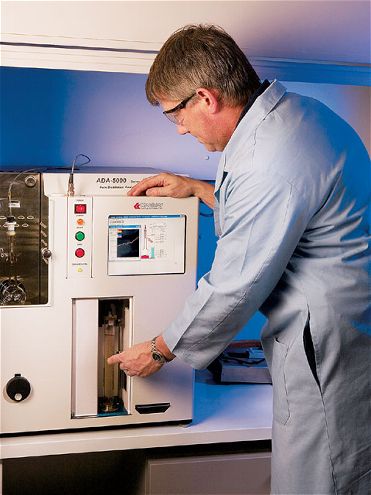
| Testing in Power Service's sophisticated laboratory allows the company's chemists to develop more consistent, better-performing fuel for your diesel engine.
How To Treat Your DieselTreating diesel fuel is very easy, and the additives should be poured into the vehicle's tank in the proper amount just before pumping the fuel. If the additive is purchased in bulk, a measuring container or some arrangement should be made so that the proper amount is used. Most additives aren't harmful to the engine if used excessively, but they become very uneconomical.
For best results, every tank of diesel fuel should be treated. If your vehicle has accumulated mileage without the benefit of treatment, then a more concentrated dose should be employed for the first few fill-ups.
During winter months in cold climates, make sure you use an additive that also eliminates gelling; that's not required the rest of the year. At the very least, you want an additive that'll displace moisture, improve cetane, and states that it cleans injectors and removes carbon deposits.
A trained ear can tell a diesel engine that's suffering from many miles of untreated fuel. The exhaust note won't be smooth, the idle quality will be poor, the combustion noise will be harsh, and the exhaust smoke level will be higher than normal. It's sad to see an enthusiast who has invested a large sum of money in speed parts but ignores the performance and reliability that can be gained from a few ounces of Power Service. When it comes to diesel, very little returns more performance for the dollar than spiking the fuel.
 | Here are the 750,000-gallon bulk chemical storage towers on Power Service's 26-acre manufacturing facility.
Diesel fuel is a commodity we spend a lot of money on, know little about, and hardly ever see. Yet it is the lifeblood of our passion. If we are what we eat, then a diesel engine is the fuel it consumes. Just as we can fill our bodies with junk food, the same holds true for the fuel tanks in our vehicles. For a healthy, running compression- ignition engine, you need to know a little about the fuel you're buying.
Understanding Fuel
| Here are the 750,000-gallon bulk chemical storage towers on Power Service's 26-acre manufacturing facility.
Diesel fuel is a commodity we spend a lot of money on, know little about, and hardly ever see. Yet it is the lifeblood of our passion. If we are what we eat, then a diesel engine is the fuel it consumes. Just as we can fill our bodies with junk food, the same holds true for the fuel tanks in our vehicles. For a healthy, running compression- ignition engine, you need to know a little about the fuel you're buying.
Understanding Fuel | diesel Fuel Kits front View
A Lesson In Gasoline
| diesel Fuel Kits front View
A Lesson In Gasoline | diesel Fuel Factory inside
Diesel Fuel Basics
| diesel Fuel Factory inside
Diesel Fuel Basics | The cold-filter plugging test confirms the effect of additives on the fuel's ability to stay liquid.
Why Cetane Is Important
| The cold-filter plugging test confirms the effect of additives on the fuel's ability to stay liquid.
Why Cetane Is Important | A water titration test determines the water content in a sample of diesel fuel.
Cold-Filter Plugging Point (CFPP)
| A water titration test determines the water content in a sample of diesel fuel.
Cold-Filter Plugging Point (CFPP) | This is a fuel lubricity wear test being performed in the laboratory.
Lubricity
| This is a fuel lubricity wear test being performed in the laboratory.
Lubricity | Testing in Power Service's sophisticated laboratory allows the company's chemists to develop more consistent, better-performing fuel for your diesel engine.
How To Treat Your Diesel
| Testing in Power Service's sophisticated laboratory allows the company's chemists to develop more consistent, better-performing fuel for your diesel engine.
How To Treat Your Diesel